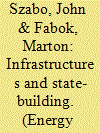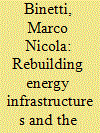| Srl | Item |
| 1 |
ID:
171527


|
|
|
|
|
| Summary/Abstract |
Energy is the lifeblood of a state's economy, which leads energy infrastructures to form intricate relations with state-building. We assess how state-building and energy infrastructures are intertwined and shape one-another. To explore this nexus, we have developed a novel framework that traces the ideology, the political economy, and the technopolitics in this relation. Through case studies focusing on the actions of the European Commission alongside those of the self-proclaimed illiberal governments of Hungary and Poland, we convey the variegated approaches embodied in the state-building – energy infrastructure relation. The Commission has sought to further an integrationist agenda predicated on its bid to create a single EU energy market. This stands in contrast to the paternalism embodied in the approach of the Hungarian and Polish governments to energy infrastructures. These emphasise nationalisation, state-control of key energy sector actors and infrastructures, as well as control over consumer prices. Hungary has also sought to position itself as a regional energy hub, while Poland has looked to maintain energy self-sufficiency, while struggling to meet EU climate goals. We find that the approaches of self-proclaimed illiberal EU countries frequently clash with the Commission's visions. However, in many cases they are reconcilable, although on fundamentally different ideological, political economic, and technopolitical grounds.
|
|
|
|
|
|
|
|
|
|
|
|
|
|
|
|
| 2 |
ID:
188568


|
|
|
|
|
| Summary/Abstract |
Conflicts severely depress the manufacturing sector of affected countries and jeopardize its recovery once peace is re-established. Yet, I claim that donors' commitment to restore and develop infrastructures to generate, distribute, store and manage energy may boost an upswing of the manufacturing sector in post-conflict settings. This is because, first, as opposed to conventional developmental aid, post-conflict aid is proven to be unusually productive and unlikely to trigger the appreciation of the real exchange rate. Second, because restoring and enhancing energy infrastructures is expected to increase the return on investments in the manufacturing sector. To test my hypothesis, I resort to a cross-section time-series two-stage least squares multivariate analysis covering 45 post-conflict countries between 1970 and 2013. I find that donors' commitment to rebuild and enhance energy infrastructures in post-conflict countries has positive effects on the manufacturing sector of recipient countries both in the short and in the medium term. These findings contribute both to shed more light on the impact of foreign aid in fragile and post-conflict countries, and to the literature investigating the impact of electrification in developing economies.
|
|
|
|
|
|
|
|
|
|
|
|
|
|
|
|